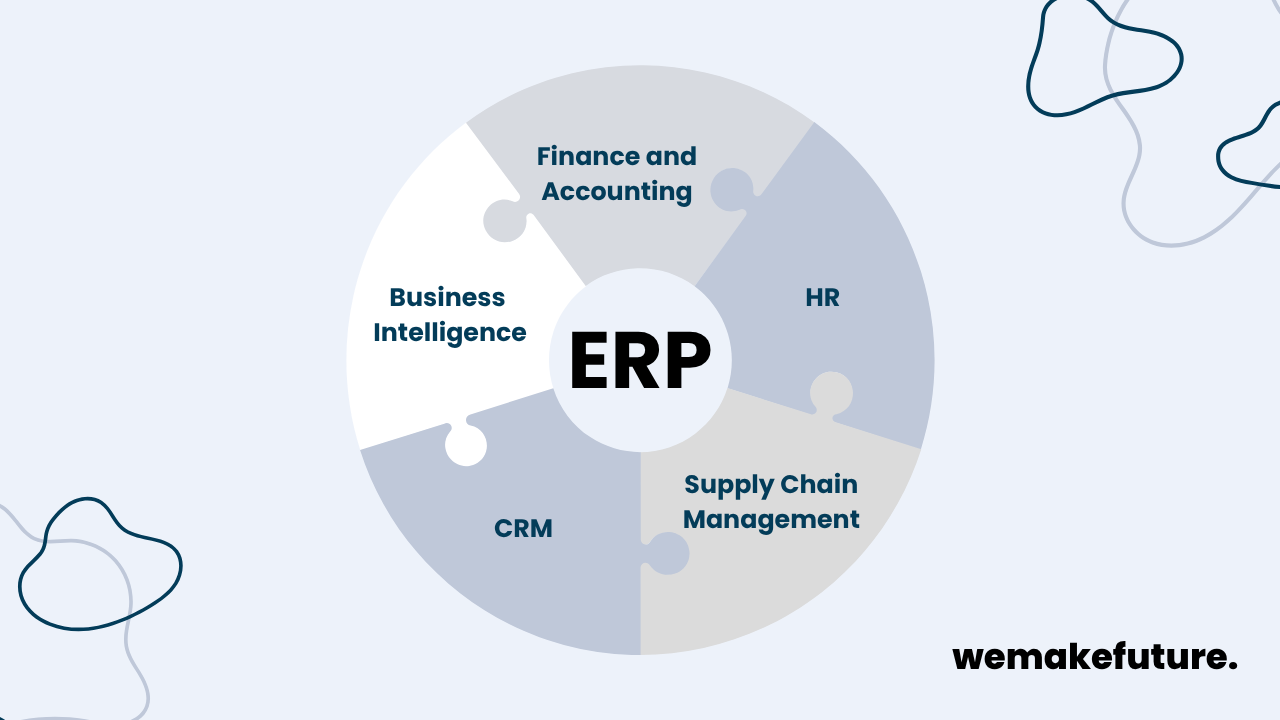
ERP: another three-letter acronym you should know if you’re looking to improve operations and integrate core processes in your business. More than just software, ERP is a powerful tool that can help you streamline your workflows and unify different aspects of your organization under one system.
ERP stands for Enterprise Resource Planning and refers to a type of software that helps organizations manage and integrate their essential business processes in one centralized system. Simply put, it’s the digital backbone of a business. Instead of running different standalone applications or manually coordinating operations, companies use ERP systems to unify all their departments and functions under one software solution.
An ERP software system can integrate accounting, human resources, supply chain management and customer relationship management (CRM) and allows each department to share data and interact seamlessly. This eliminates the silos that often arise when departments use separate tools and processes.
The concept of ERP has evolved significantly since its inception in the 1960s. Initially, ERP systems were designed to handle specific business processes like inventory management or accounting. Over time, as businesses grew and the need for integrated systems became apparent, ERP solutions evolved into comprehensive platforms that cover virtually all aspects of business operations.
Emerging technologies such as cloud ERP solutions offer greater flexibility, scalability, and cost-effectiveness compared to traditional on-premises systems. In a postmodern approach, AI and machine learning are also being integrated into ERP systems to provide predictive analytics, automate routine tasks, and enhance decision-making processes. Read more about Postmodern ERP here.
ERP software solutions typically consist of several integrated modules that cater to different business functions. Some common features include:

Implementing an ERP system may require an investment of time and resources, but the benefits are well worth it. Here are some of the advantages:
By automating and integrating various business processes, ERP systems reduce the need for manual input, minimizing errors and saving time.
Centralized data also reduces the risk of errors and inconsistencies common in decentralized systems.
With real-time data and insights into all facets of your business, you can make data-driven decisions and strategic plans quickly.
ERP systems grow with your business, making it easier to accommodate new processes, additional users, and expanding data needs without significant overhauls.
With centralized data and integrated processes, different department can collaborate more effectively, which also fosters a more cohesive work environment.
Many ERP systems come equipped with tools to help businesses comply with industry regulations and standards.
There are many ERP providers catering to different industries and business sizes. One of the most popular ERP software vendors is SAP, a market leader that offers comprehensive features for large enterprises. Oracle NetSuite, another popular solution, is a cloud-based ERP system designed for scalability and flexibility.
For users that already work with Microsoft products, Microsoft Dynamics 365 offers a highly attractive alternative, as it easily integrates with these products. Finally, Odoo provides an all-in-one open-source ERP system suitable for small and medium-sized businesses.
Nowadays, ERP systems are an essential tool for businesses that want to operate efficiently, make agile decisions, and simply stay ahead of the competition. Adopting an ERP solution may require time and resources, but it will undoubtedly be worthwhile for both small startups and well-established businesses.
If you're considering implementing an ERP system, take the time to evaluate your business needs and consult with experts to ensure a smooth and successful transition. Simplified processes, improved insights, and the capacity to scale your company are just a few of the enormous benefits that come with the potentially complex road.
Feel free to contact us for an ERP consultation if you require further assistance!
Stay up-to-date with us.